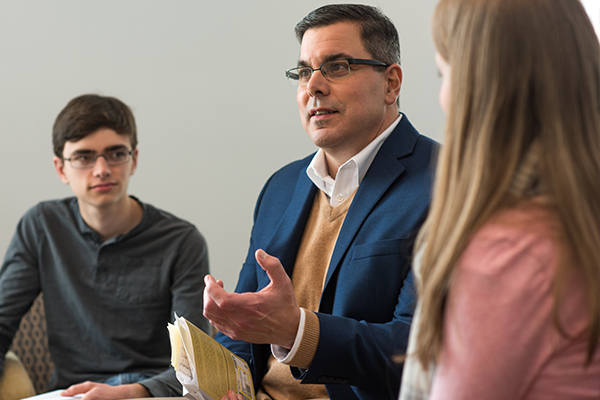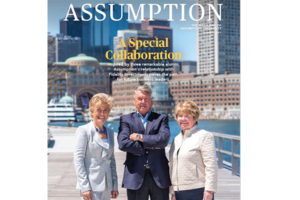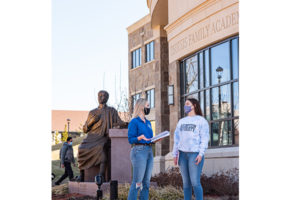
In a recent survey by the Association of American Colleges and Universities, 74 percent of employers reported that their most dynamic workers have a liberal arts education.
At Assumption, this came as no surprise.
When former students call director of the center for global studies Kevin Hickey, the conversation often begins with: “Hi, Professor Hickey. You’ll never believe what I’m doing now!”
Prof. Hickey is seldom surprised by what graduates share with him about their career trajectories. In fact, he typically welcomes new families to campus by saying, “I have a number of truths to tell you. The first is that, one day, you will have a job. The second is that I have no idea what that job will be. Anyone who says that college is a path to prepare you for a specific career is simply not being honest.”
Hearing that makes students and parents sit up straighter. They might even look alarmed. College is a significant investment. Shouldn’ t you know exactly what outcome you’ re paying for at the end of four years?
The truth is that most graduates don’ t know. And with evolution in technology, knowing is impossible, yet exciting. According to the U.S. Department of Labor, the average American changes jobs every 4.2 years, and more than 30 percent of the jobs that will be available in five years don’t even exist yet.
That’ s why a liberal arts degree can be the best foundation for any future career. “A liberal arts education is like cross-training for your brain,” Prof. Hickey said. “It goes perfectly with not always knowing what is ahead, but preparing for it anyway.”
Rhode Island native Nick Veltri ’ 07, now an investment banker at Morgan Stanley in New York City, couldn’ t agree more. “Assumption and my work in the liberal arts helped open my mind and prompted me to ask the right questions, particularly of myself,” he said.
A Liberal arts degree: Mental agility and career flexibility
After graduating from LaSalle Academy, a Catholic high school in Providence, Veltri was attracted to Assumption for its Catholic intellectual tradition and strong liberal arts curriculum. With his sights set on applying to law school, he chose to major in political science. A former administrator at Assumption encouraged him to add a handful of accounting courses to expand his career opportunities.
The accounting courses earned Veltri his first job post-graduation, but it was the combination of his accounting skillset and his liberal arts background that helped him successfully navigate his way from an MBA degree at Yale University to his current position at Morgan Stanley.
“The business environment is very similar to the liberal arts environment,” he said. “Everyone is working together to bring their strengths and motivations to the table.”
As he started learning more about mergers and acquisitions, “it struck a chord with me,” he said. “This area has a strong underpinning of financial planning for my accounting side, and it incorporates the human elements of considering the various and sometimes contradictory interests of the people behind these negotiations for my political science side.”
Veltri’ s story is one of many examples in which a liberal arts education proved to be the perfect launchpad for career paths that took unexpected turns. When Prof. Hickey looked at Assumption’ s Convocation Award winners from past years, for example, he found a psychology major who went to graduate school for physical therapy, a classics major who took a job in business, a women’ s studies major who was accepted into a doctoral program in economics, an art history major who is now an MBA student, and – well, the list goes on.
“Academic agility, that’ s Assumption,” Prof. Hickey concluded. “And that’s life!”
For Greg Kaminsky ’ 87, who first learned about life and the value of hard work on a farm in rural Connecticut, studying the liberal arts at Assumption “opened my eyes to the world.”
A foreign affairs (now known as global studies) major and economics minor who is now managing director of Highbridge Capital Management, a global investment firm in New York City, Kaminsky said that some of the most valuable skills he learned at Assumption probably aren’ t the ones people typically associate with a business career.
“Assumption was a launching pad for me,” he said, explaining that his studies taught him to be a good listener and a good communicator, and to think critically.
Kaminsky’ s first job in business, as a runner on the trading floor for Merrill Lynch, was what he called “the lowest-level job” in the industry – one where he had to compete with others who had degrees from Ivy League schools – as he told a group of Assumption students visiting his office on a spring break externship trip. “If you’ re willing to work harder than anyone else, that’ s what will set you apart,” he said.
Through his guest lectures for business classes, meetings with students and faculty members, and hosting Assumption students at Highbridge Capital, Kaminsky regularly reconnects with his alma mater. “I enjoy mentoring students because I know what it’ s like to be in their shoes,” he said.
Our top priority: teaching students to live “a genuinely human life”

Both Veltri and Kaminsky demonstrate the value of a liberal arts education from Assumption, not only in business but in any field, said Provost and Academic Vice President Louise Carroll Keeley, Ph.D. “The traditional aims of the liberal arts have been to foster a person’ s ability to write and speak well, to know the culture and the history which has shaped a person or an idea, and to reason carefully with a broadly informed point of view.”
Rooted in the Catholic intellectual traditions of the love for learning and the pursuit of truth, Assumption is committed to meeting those aims. Through the Core Curriculum, all students are required to enroll in five different areas of study, each of which brings perspective to a classical liberal arts education. First-year Core Seminars introduce essential philosophical, literary, and theological texts, after which students choose liberal arts courses that best match their personal and professional interests and give them a solid foundation for anything they’ ll study in the future.
In addition, the institution’s unique Core Texts & Enduring Questions (CTEQ) Program serves as a unique hub for a liberal arts education at Assumption, said Professor Marc Guerra, Ph.D., ’ 90, G’ 94, director of CTEQ and chair of the Theology Department. The goal of the CTEQ program is to awaken and cultivate each student’ s desire “to be thoughtful of what it means to be and live as human beings,” he explained.
The CTEQ program offers an intellectually rich, engaging interdisciplinary minor to complement a student’ s studies in a pre-professional, natural science, mathematics, or humanities major. The classes – drawn from art history, theology, philosophy, and political science – encourage students to explore enduring questions about the nature of justice, beauty, human nature, and God.
“As people, we all have a host of big questions that we think about,” said Guerra, “but too often we do not ask about the root of those questions: What does it mean to live a genuinely human life, both individually and collectively?”
A prove recipe for success: connecting liberal arts majors with career counseling
When Alex Cerbo ’ 18 applies to law school after graduating from Assumption this May, he knows he won’ t be “the cookie cutter candidate that many law school applicants are.” But that’ s fine with him.
As a double major in psychology and criminology, he has gained “a vast education, learning about issues such as mental health disorders, clinical settings, mental health treatment, and resources,” he said.
But wait, there’ s more: Cerbo says he has also learned about “the criminal justice system, the prison system, and the stigma and societal issues that surround both mental health and the criminal justice system.”
More importantly, Cerbo hasn’ t just learned about these high-profile topics through textbooks or his classes, but firsthand. “I have, throughout my time at Assumption, interned at two psychiatric units, a prison, and a district attorney’ s office,” he explained. “I have accumulated a vast array of experiences, skills, and connections, and I am so blessed because of that.”
Studies have shown, these days a student’s choice of major – whether in liberal arts or pre-professional field – often counts less with future employers than practical experience. Fortunately, while Assumption’ s renowned professors work side by side with students to develop crucial liberal arts skills like communication and critical thinking, the Career Development and Internship Center (CDIC) staff helps students develop robust career skills and hands-on work experiences from the moment they set foot on campus.
“My interaction with the CDIC is constant,” said Cerbo, who hopes to add a fifth internship in summer 2018 with the Rhode Island Attorney General. “I have taken full advantage of the many resources they offer, from reviewing my resume and mock job interviews to finding internships.”
The value of the liberal arts education he has received at Assumption is “immeasurable,” he added. “All of the classes I have taken have seemed to connect in such a way that I am able to learn about all aspects of humanity and the world in which we live.”
Alexis Wilusz ’ 18, originally recruited to Assumption for the swim team, fell in love with the institution’s criminology courses and ultimately chose to triple major in criminology, psychology, and sociology. Freshman year, an internship through the Psychology Department led her to work with children with autism, something she has been doing now for four years. “That opportunity set me up to be a senior with multiple job offers,” she said.
Through her criminology major, Wilusz attended The Washington Center in DC, where she worked for the Corrections Information Council, an independent monitoring body that looks at how inmates are treated in federal prisons.
Her career goal is to ultimately work for a government intelligence agency. Wilusz knows that goal may change, but she isn’ t worried. “The liberal arts foundation at Assumption has set me up to have a well-rounded education,” she said.
She is right to feel confident. The unique blend of liberal arts education and strong career development at Assumption is a recipe for success, as recent graduates have demonstrated: More than 94 percent of Assumption’ s Class of 2017 graduates were employed, pursuing additional education, enlisted in the military, or participating in postgraduate service opportunities by January 2018.
“Life and learning at Assumption are all about relationships,” said Shannon Curtis, director of the CDIC. “We strive to make sure that every career development service we offer is highly individualized, so students can see how what they know and who they are not only related to many different career paths, but also to the bigger purpose of who they’ve been called to be.”


